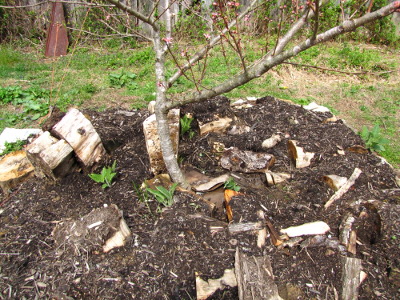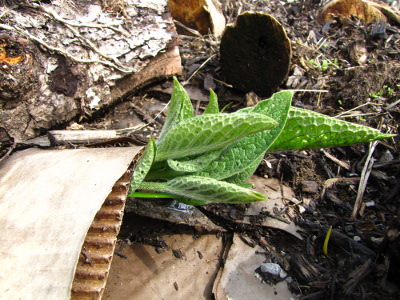
Comfrey is hard to kill
 Last year, I decided that the
comfrey I had planted underneath my nectarine was competing with the
tree for nutrients
and had to go. I waited until the fall, then laid down a layer of
cardboard topped with punky wood, compost, and wood chip mulch.
Surely, I thought, the comfrey will die under such a serious kill mulch.
Last year, I decided that the
comfrey I had planted underneath my nectarine was competing with the
tree for nutrients
and had to go. I waited until the fall, then laid down a layer of
cardboard topped with punky wood, compost, and wood chip mulch.
Surely, I thought, the comfrey will die under such a serious kill mulch.
"Hi there!" the comfrey
called last week as it poked its way up between seams in the cardboard. "Such a nice
spring!" added another comfrey plant that had moved an entire  log aside to make way for its
new growth.
log aside to make way for its
new growth.
Folks who warned me that comfrey is hard to kill were entirely right. If you're thinking of
some comfrey interplantings, take heed --- once you put comfrey in a
location, it's there to stay.
Want more in-depth information? Browse through our books.
Or explore more posts by date or by subject.
About us: Anna Hess and Mark Hamilton spent over a decade living self-sufficiently in the mountains of Virginia before moving north to start over from scratch in the foothills of Ohio. They've experimented with permaculture, no-till gardening, trailersteading, home-based microbusinesses and much more, writing about their adventures in both blogs and books.
Want to be notified when new comments are posted on this page? Click on the RSS button after you add a comment to subscribe to the comment feed, or simply check the box beside "email replies to me" while writing your comment.

Curious what you are seeing that tells you the two are competing for nutrients? Do you think it could also be just the water logging causing the issue?
You might consider not putting so much mulch down as it will not allow the area to dry out periodically.
Also, I would recommend mulching the tree with green manure from vetches and yarrow for additional nutrient accumulation, especially Copper. Could maybe plant some Bracken fern around there for the same reason.
sorry for the unsolicited advice. keep up the great work.
I've got several fruit trees growing in the waterlogged area, but only have comfrey under one, and that's the only tree that showed signs of lack of nitrogen (yellowing foliage) last year. In that area, I plant the trees in raised beds, so they're not actually waterlogged and, if anything, get a bit dry, thus the mulch. It's a bit like growing a tree in a pot, though, because the main soil beneath the raised bed is often too wet for growth.
I generally keep the green mulches for the vegetable garden since they promote bacterial dominance in the soil. Using woody mulches for trees promotes fungal dominance, which is generally appreciated by trees and shrubs. If I was lacking a certain nutrient, though, I'd be sure to mulch with a dynamic accumulator of that nutrient.
If you are still interested in the Bocking 14, I found root cuttings available at this site: http://www.horizonherbs.com/product.asp?specific=1606
I was all ready to purchase them, but then read about how invasive it can be and I'm not sure if I'm ready for any more invasive plants right now. I suppose that works in its favor if you can keep up with the maintenance, but I have seen what happens with aggressive garden plants after the original gardeners get old and leave them behind... and it's not pretty.
The only evidence I have that it might be invasive in wild areas is anecdotal, and perhaps based on fear. Also, I'm not sure exactly which plant, and I think the invasiveness of the hybrid is still uncertain.
It sounds like a great plant, but I don't really have a good plan to control it and I'd hate to be overwhelmed by something that I thought would be beneficial.
I have neighbors who have planted comfrey and other deep-rooting plants at the side of their house. They now have serious basement leak problems maybe not caused by comfrey and these other plants, but certainly exacerbated by them.
I write this because this afternoon I decided to remove a comfrey plant I had moved from one side of my garden -- next to the aforementioned neighbors -- to the other. The plant is not all that mature, but when I dug up the root, I was stunned. A plant that last year grew only about a foot high had the roots of a seven foot tree, and the center of the root bundle was the size of my fist.
Comfrey is a serious threat to other plants, primarily because it grows so fast and has a broad leaf-span. and ends up overshadowing other slower-growing plants. However, I think one should take note that such a large root structure cannot be good for other plants in the vicinity. I have a large plot of heliotropes, and while their root systems are far reaching and invasive, they are nowhere near a large as those of comfrey, and are easy to eliminate.
Comfrey is also a threat to foundations, patios and driveways because of its large powerful roots, and its ability to grow just about anywhere that has a decent amount of sun.
Because of my neighbors' failure to control their comfrey, I have plants growing all over my property, and too near my driveway. Sooner or later I am going to have to take the neighbors to task over this, because, while the driveway is one thing, sooner or later the comfrey is going to get too close to my foundation and present a serious problem. And, as I noted, digging this stuff up takes a great deal of effort.
Btw, the big joke RE this is that my neighbors lodged a bylaw complaint about my ornamental grasses (which was quickly quashed), which are far less invasive and destructive than their comfrey.
Sounds like u guys have a bigger problem with stress than with comfrey.
Just pull it out. If it's somewhere where you don't want anything to ever grow then salt the ground